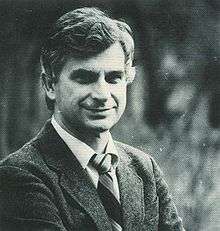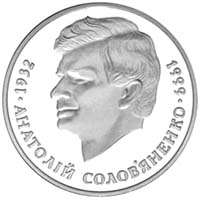Anatoliy Solovianenko
Anatoliy Solovianenko (sometime transliterated as Anatolii Solovyanenko;[1] Ukrainian: Анатолій Борисович Солов'яненко; Russian: Анатолий Борисович Соловья́ненко) (September 25, 1932 – 29 July 1999) was a Ukrainian operatic tenor, People's Artist of the USSR (1975), People's Artist of Ukraine, and State Taras Shevchenko prize-winner.[2]
Anatoliy Solovianenko | |
|---|---|
 Anatoliy Solovianenko, circa 1984 | |
| Born | 25 September 1932 Donetsk, Ukrainian SSR, Soviet Union |
| Died | 29 July 1999 (aged 66) |
| Occupation | Opera singer (tenor) |
| Awards | |
He was born into a mining family in Donetsk and graduated from Donetsk Polytechnic Institute in 1954. He also studied singing with Alexander Korobeichenko from 1950. Solovianenko began his career in Donetsk, where there is now a monument in his memory.[3] He made twelve performances at the Metropolitan Opera in Kiev, then graduated from Kiev Conservatory in 1978. For 30 years, he was soloist at the Taras Shevchenko National Opera and Ballet Theatre in Kiev, and performed at Expo 67 in Montreal.[4] During the 1977–78 season, Solovianenko performed as a soloist at the New York Metropolitan Opera.[5][6] He also performed as soloist for the Alexandrov Ensemble during its UK tour 1988, singing "Kalinka" and other songs.[7] He recorded 18 LPs of arias, romances and songs.[8]

Life and career
Anatoliy Solovianenko was born in Donetsk (Stalino at that time) on 25 September 1932 into a miner's family.[9][10] In 1954 he graduated from Donetsk Technical University,[11] after which he taught there in the engineering graphics department.[5]
He began taking singing lessons in 1950 from Alexander Korobeychenko, Honoured Artist of the Russian Soviet Republic. Success in a popular talent show of 1962 led to an invitation to sing at the National Opera of Ukraine. But before starting work in the National Opera, Solovyanenko won the young singers' contest at Milan's La Scala, and studied there for three years (1963–1965). He became the first Soviet singer to receive an invitation to perform at New York's Metropolitan Opera.[10][12] Starting from 1965 Solovyanenko performed with the National Opera of Ukraine. In 1967, he was awarded the rank of Honoured Artist of Ukraine, and in 1975 the rank of People's Artist of the USSR.
He graduated from the Kiev Conservatory in 1978. Being the soloist of the National Opera, Anatoliy Solovyanenko sang 18 parts, among them: Duke (Rigoletto), Alfredo (La Traviata), Tenor (Requiem), Edgardo (Lucia di Lammermoor), Rodolfo (La Boheme), Kavarosen (Tosca), Faust (Faust), Lenskiy (Yevgeniy Onegin), Pretender (Boris Godunov), Andrey (Zaporozhec across the Danube) and many others. Anatoliy Solovyanenko was married and had two sons, Andrey and Anatoliy.
Anatoliy Solovyanenko died suddenly from a heart attack on 29 July 1999. Among various government officials who attended his funeral was President Leonid Kuchma,[1] and several months later, in December 1999, the Donetsk State Academic Opera and Ballet Theatre was renamed in his honor by the Ukrainian Cabinet.[13] In 2001, a statue of the singer was installed at Kozyn (within the Kyivska oblast), where he is buried.[14]
Awards
- 1967 - Honoured Artist of Ukraine
- 1975 - People's Artist of the USSR
- 1980 - Lenin Prize, money prize was transferred by A.Solovyanenko to the Peace Committee
- 1982 - Miner's Glory Medal, Order of Friendship of Peoples
- 1993 - Badge of Honour from President of Ukraine
- 1997 - Taras Shevchenko National Prize
Recognition
- Donetsk Opera and Ballet Theater was named in honor of Anatoly Solovyanenko. The monument to him was installed near the theatre.
- Another monument was installed in Kiev at 16 Institutska Street; the house is marked by a memorial plaque.
- A musical named "Vyzov Sud'be" (eng. - Defy the odds) featuring A. Solovyanenko was filmed at the Dovzhenko Film Studios
- In 1982 a book by A.K. Tereshchenko "A. Solovyanenko" was published, and reprinted in 1988.
References
- "Anatolii Solovyanenko, world-renowned tenor, 66". Ukrainian Weekly. 1999. Retrieved 18 November 2011.
- Bank.gov.ua webpage: commemorative coin celebrating Solovianenko 1999. Archived 2011-09-27 at the Wayback Machine
- Olymp Travel Ltd: travel guide to Donetsk region.
- "Ukrainian Music in Canada". The Canadian Encyclopedia Archived June 8, 2011, at the Wayback Machine
- "Ukrainian opera singer Anatoliy Solovianenko dies at 66". Associated Press. 30 July 1999. Retrieved 18 November 2011.
- V. A. Smoliĭ; Oksana Onoprii︠e︡nko (2001). Golden Book of Ukrainian Elite , Volume 2. Kompanii︠a︡ "I︠E︡vroimidz︠h︡". p. 417. ISBN 978-966-7867-11-9. Retrieved 18 November 2011.
In 1977, A. Solovianenko toured in the USA giving a triumphant concert at New York Metropolitan Opera.
- Information from VHS packaging: see Alexandrov Ensemble discography page.
- Translated narod.ru webpage: Biography and discography of Solovyanenko (in Russian)
- словари. "Соловьяненко Анатолий Борисович (1932—1999) — Кто есть кто в культуре — Яндекс.Словари". Slovari.yandex.ru. Retrieved 2013-09-01.
- RIN.RU. http://rin.ru (1932-09-25). "Solovyanenko Anatoly, photo, biography". Persona.rin.ru. Retrieved 2013-09-01.
- http://who-is-who.ua/bookmaket/nagorody2006/17/119.html. Retrieved August 30, 2013. Missing or empty
|title=(help) - "Anatoly Solovyanenko. Ukrainian folk songs. // www.UMKA.com.ua". Umka.com.ua. Retrieved 2013-09-01.
- "History of Theatre". donetsk-opera-ballet.org. Retrieved 18 November 2011.
- Yevgeny, Orlovsky (30 July 2001). "Фото УНІАН". UNIAN. Retrieved 18 November 2011.
External links
| Wikimedia Commons has media related to Anatoliy Solovyanenko. |